Tabouret Haut
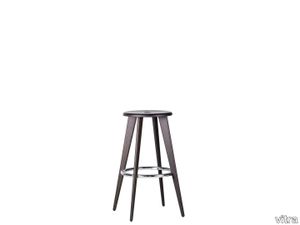
vitra > Chair
The classic Tabouret Haut bar stool by Jean Prouvé is available in robust solid oak, with a natural or dark stained finish. The chrome-plated steel ring with an anti-skid surface guarantees stability and offers comfortable use as a footrest.
Miniatures - Landi Chair
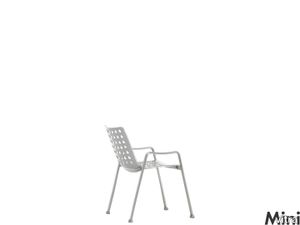
vitra > Styling
The Miniatures Collection of the Vitra Design Museum presents the most important classics of modern furniture history on a 1:6 scale and replicates the historic originals down to the smallest detail.
LOBBY CHAIR ES 108 - Swivel leather training chair with armrests _ Vitra
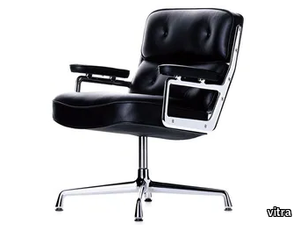
vitra > Chair
The **Lobby Chair ES 108** is a sophisticated conference chair designed for both style and comfort. It features a sleek structural design with side elements, a backrest, and a seat crafted from chromed die-cast aluminium, complemented by luxurious leather upholstery. The chair includes padded leather armrests and rests on a durable four-star base made of the same high-quality aluminium. While the seat height is fixed, the chair offers swivel functionality for added convenience. Inspired by the iconic Lounge Chair, the Lobby Chair combines three individual cushions seamlessly joined by aluminium side frames, ensuring exceptional comfort. Originally designed for the lobby areas of New York's Time Life Building, it is available in three variations: the ES 104 office swivel chair, the ES 108 conference chair on glides, and the wider, lower ES 105 armchair for lounges and waiting areas. A 3D file of the product is available for download, allowing for detailed visualization and planning. **Vitra**, the supplier, is a renowned Swiss family-owned company established in 1950, celebrated for its innovative and timeless furniture designs that merge functionality with aesthetics. Collaborating with legendary designers like Charles and Ray Eames, Vitra creates versatile, durable, and stylish pieces for homes, offices, and public spaces, making it a global leader in modern furniture design.
HAPPY BIN L - ABS waste paper bin _ Vitra
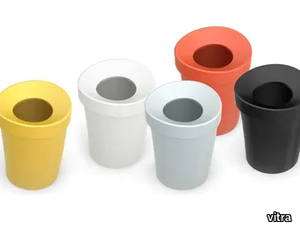
vitra > Accessories
The Happy Bin, designed by Michel Charlot, brings a playful and organic aesthetic to the office environment with its whimsical, cartoon-inspired shapes that add a cheerful vibe to any workspace. Inspired by the sculptures of Hans Arp, this waste paper bin features a lightweight, irregular form that mimics natural growth while adhering to industrial production standards. Crafted from durable polypropylene, the Happy Bin is available in two sizes and a variety of vibrant colors, blending functionality with artistic expression. A 3D file of the product is also available for download, offering flexibility for design integration. Supplied by Vitra, a renowned Swiss family-owned company founded in 1950, the Happy Bin reflects Vitra's commitment to innovative, timeless designs that merge aesthetics with practicality, making it a perfect addition to modern office settings.
METAL SIDE TABLE OUTDOOR - Powder coated steel garden side table _ Vitra
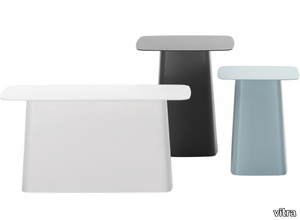
vitra > Side table
The Metal Side Tables, available in both indoor and outdoor versions, feature a durable design with bent and welded sheet steel for the tabletop and base, galvanized and powder-coated for a fine surface texture, and equipped with polyamide glides for stability. These versatile tables, with their thin tabletops and plinth-like bases, create a striking contrast and are suitable for a variety of settings, from residential to public spaces. Offered in multiple sizes and colors, they seamlessly blend into diverse interior designs. Additionally, a 3D file of the product is available for download, allowing for detailed visualization and planning. Manufactured by Vitra, a renowned Swiss family-owned company founded in 1950, the brand is celebrated for its innovative, timeless designs and collaborations with iconic designers, offering a wide range of high-quality furniture and accessories for homes, offices, and public spaces.
Miniatures La Mamma
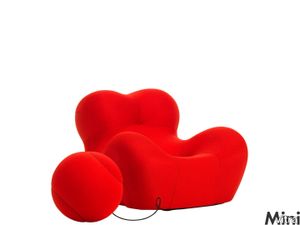
vitra > Styling
La Mamma (Donna) is completely in tune with the spirit of Pop Art and the Gaetano Pasce fondness for anthropomorphic shapes. The chair was actually designed to resemble a prehistoric, female fertility figure, with a ball attached to symbolize captivity. The unconventional nature of the shape also applies to the construction and marketing of the chair which was one of a series of six.<br/><br/>Together they succeeded in marking a radical break from traditional upholstery production thanks to the technology developed by C & B Italia for creating oversized foam parts. Donna consists of a molded monoblock of foam withut any supporting structure since the foam rubber is dense and free-standing. First a finished piece of furniture covered with elastic nylon jersey is reduced in a vacuum chamber to about 10% of its normal volume and is then wrapped in airtight foil. The customer can easily transport the otherwise unwieldy piece single-handedly. After removal of the wrapper at the destination, the chair slowly recoveres its original shape without outside help as air seeps back into the capillaries of the polyurethane foam.
Storage Cabinets
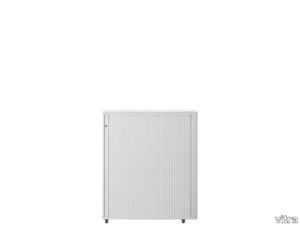
vitra > Cabinet
The Storage cabinet range – variably equipped with shelves, hinged doors, drawers or tambour shutters – comes in several different heights and in widths of 80, 100 and 120 cm. The cabinet units can be linked vertically, horizontally and back to back.
ORGANIC HIGHBACK - Fabric chair high-back _ Vitra
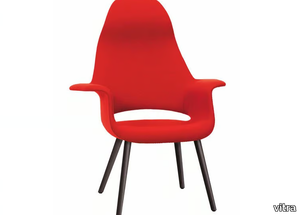
vitra > Chair
The Organic Chair, a compact and ergonomic reading chair, was originally conceptualized in multiple iterations for the 1940 ‘Organic Design in Home Furnishings’ competition hosted by the Museum of Modern Art in New York. Its avant-garde, sculptural design was groundbreaking for its time, though production was initially hindered by the lack of suitable manufacturing techniques. It wasn’t until the 1950s, with advancements in technology, that organically shaped seat shells, like those seen in Charles and Ray Eames’s Plastic Armchair or Saarinen’s Tulip Chair, could be mass-produced. The Organic Chair is available in various forms, including the Organic Highback armchair, featuring an extended backrest and longer, wider armrests, and the Organic Conference chair, designed for table seating and offering exceptional comfort with its biomorphic shell. Designed by Charles Eames and Eero Saarinen in 1940, this chair remains a timeless classic. Materials include a laminated seat shell, polyurethane foam upholstery with a fabric cover, and legs in black ash or natural oak, complemented by plastic glides for carpets and felt glides for hard floors. A 3D file of the product is also available for download, allowing for detailed visualization and planning. Vitra, a Swiss family-owned company founded in 1950 by Willi Fehlbaum, is renowned for its innovative and iconic furniture, lighting, and accessories, blending functionality with aesthetics through collaborations with legendary designers like Charles and Ray Eames, George Nelson, and Verner Panton.
Suita 2-Seater, pointed cushions
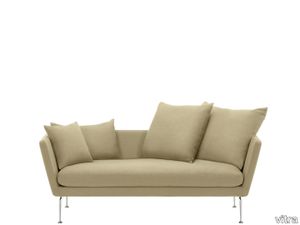
vitra > Sofa
Characterised by an elegant technological aesthetic, the Suita sofa family (2010/2019) by Antonio Citterio comprises many different components. These can be freely combined or also used as independent elements.
Ronan Bouroullec Drawing Poster, bicolour
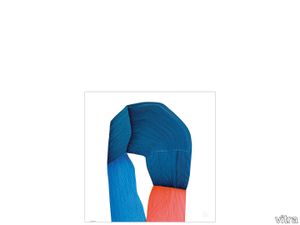
vitra > Styling
The drawings of Ronan Bouroullec exemplify the practice of 'intuitive drawing', derived from Surrealism's literary roots and its écriture automatique.
DSS-N - Stackable polypropylene training chair _ Vitra
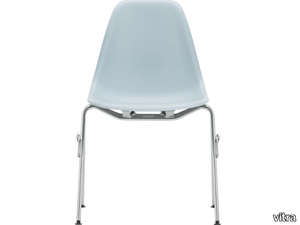
vitra > Chair
The Eames Plastic Chairs, renowned for their versatility and timeless design, serve as ideal seating solutions for auditoriums, conference rooms, media spaces, and assembly halls. Available in models like the stackable DSS and DSS-N, these chairs can be linked in rows (DSS) or stacked up to 8 chairs without upholstery and 5-6 chairs with upholstery, depending on the configuration. Starting January 2024, Vitra has introduced the Eames Plastic Chairs RE, crafted from recycled post-consumer plastic sourced from Germany's 'Yellow Bag' household waste collection, significantly reducing energy consumption and emissions. The chairs feature a variety of bases and shell colors, with upholstery options available, allowing for endless customization to suit diverse environments, from homes and offices to public spaces. A 3D file of the product is available for download, enabling detailed visualization and planning. Vitra, a Swiss family-owned company founded in 1950, is celebrated for its innovative, high-quality furniture and collaborations with iconic designers like Charles and Ray Eames, offering a blend of functionality, aesthetics, and sustainability across its global operations.
Ceramic Container No. 1
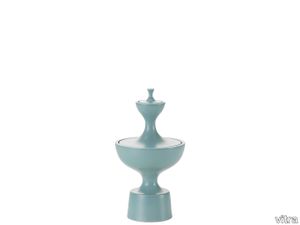
vitra > Styling
The hand-glazed Ceramic Containers (1952) derive from the original lathe-turned wooden objects by Alexander Girard. Their silhouettes are reminiscent of the traditional shapes of apothecary vessels, board game tokens or millinery blocks.
AC 5 STUDIO - Swivel leather office chair _ Vitra
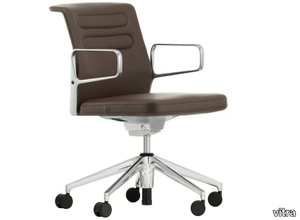
vitra > Chair
The AC 5 Studio is a sleek and minimalist office chair from the AC 5 Group, designed for dynamic work environments such as touchdown workstations. Featuring a rocking mechanism and height adjustment, it ensures comfort and adaptability for users. Its signature angled backrest not only unifies the design across the AC 5 series but also promotes freedom of movement, encouraging dynamic sitting. The chair is available with fabric or leather upholstery, a polished aluminium or plastic base, and optional die-cast aluminium armrests with leather pads. Developed in collaboration between renowned designer Antonio Citterio and Vitra, the AC 5 Studio exemplifies a blend of functionality and aesthetic elegance, making it ideal for modern office settings. A 3D file of the product is available for download, allowing for detailed visualization and planning. Vitra, a Swiss family-owned company founded in 1950, is celebrated for its innovative and timeless furniture designs, crafted in collaboration with world-renowned designers and tailored for diverse environments, from offices to public spaces.
AM CHAIR - Swivel mesh office chair with armrests _ Vitra
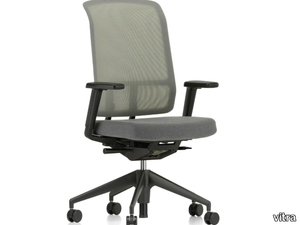
vitra > Chair
The AM Chair is a masterful blend of engineering precision, ergonomic design, and aesthetic elegance, offering a perfect balance of functionality and style. Its dynamic armrests, height-adjustable backrest, and lightweight yet durable plastic frame, available with fabric or mesh covers, create a sleek and graceful silhouette. Designed to meet modern office demands, the chair features a synchronised ProMotion mechanism that automatically adjusts to the user's weight, ensuring personalised comfort without manual intervention. Additional intuitive controls allow for fine-tuning, while the ergonomic contours of the backrest and moulded seat cushion promote healthy posture and immediate comfort. Ideal for both prolonged desk work and dynamic touchdown workstations, the AM Chair is versatile, practical, and stylish. For added convenience, a 3D file of the product is available for download, enabling users to explore its design in detail. Supplied by Vitra, a Swiss family-owned company renowned for its innovative and iconic furniture designs since 1950, the AM Chair reflects the brand's commitment to blending functionality with timeless aesthetics. Vitra collaborates with world-class designers to create versatile, durable, and visually striking pieces for homes, offices, and public spaces.
Eames Tandem Seating ETS
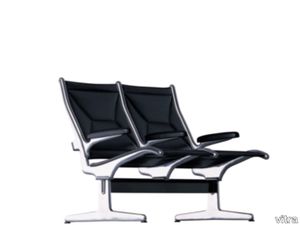
vitra > Chair
Designed by Charles and Ray Eames for use in waiting areas, the robust Tandem Seating system has proven its quality over a period of decades, providing a comfortable place to sit in airports, train stations and other public spaces. The modular units can be configured to meet individual requirements.
ALCOVE LOVE SEAT LOWBACK LOUNGE - Fabric small sofa _ Vitra
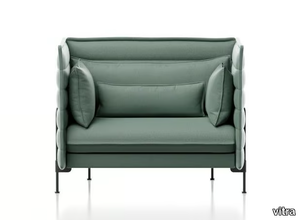
vitra > Sofa
The **Alcove Love Seat Lounge** is a versatile sofa available with either high or low backrests, designed to create intimate spaces of shelter and seclusion. Its body features organic fiberboard core panels connected with zip fasteners, while the quilted cover is padded with polyester fiber for added comfort. The frame is crafted from tubular steel, available in chrome-plated or powder-coated finishes, complemented by steel legs in matching finishes and felt glides for floor protection. Optional lockable castors in soft black plastic are available for added mobility. The sofa’s soft 'Lounge' upholstery ensures a relaxed sitting experience, supported by a durable metal frame with upholstery webbing and an MDF base board. Seat and back cushions are filled with polyurethane foam and polyester fiber, while optional cushion sets include armrest and back cushions for enhanced comfort. The removable covers make maintenance easy, and the design’s modularity allows for creating a "room within a room" when paired with another sofa. The Alcove Love Seat is part of Vitra’s Alcove family, a product line developed in collaboration with designers Ronan and Erwan Bouroullec, which emphasizes mobile micro-architectural elements for modern office and living spaces. A 3D file of the product is available for download, enabling detailed visualization and planning. **Vitra**, a Swiss family-owned company founded in 1950 by Willi Fehlbaum, is renowned for its innovative and iconic furniture, lighting, and accessories that blend functionality with timeless aesthetics, collaborating with legendary designers like Charles and Ray Eames and Verner Panton to create versatile, durable, and stylish pieces for homes, offices, and public spaces.
AKARI 9AD - Japanese paper table lamp _ Vitra
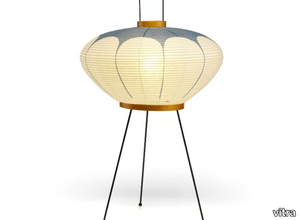
vitra > Table lamp
The Akari table lamp, designed by Japanese-American artist Isamu Noguchi, features a delicate Japanese washi paper lampshade, embodying a harmonious blend of art and functionality. Part of the Akari Light Sculptures series, which Noguchi began in 1951, these luminaires are celebrated for their weightless luminosity and organic design, inspired by traditional Japanese lanterns. Each lamp is meticulously handcrafted in the Ozeki workshop in Gifu, Japan, using bamboo frames and mulberry bark paper, ensuring a unique, artisanal quality. The Akari series includes over 100 models, ranging from table to floor and ceiling lamps, all marked with Noguchi's iconic sun-and-moon logo, symbolizing authenticity. A 3D file of the Akari lamp is available for download, offering a digital perspective of this timeless design. Supplied by Vitra, a Swiss family-owned company renowned for its innovative and iconic furniture and lighting designs, the Akari lamp reflects Vitra's commitment to blending aesthetics with functionality, as seen in their collaborations with legendary designers like Charles and Ray Eames and Verner Panton.
HAL Soft Wood
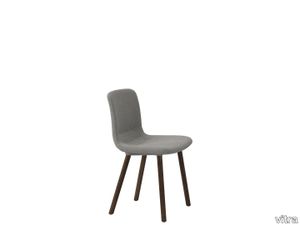
vitra > Chair
The padded upholstery of HAL Soft provides superb comfort, with rounded contours that soften the appearance of the characteristic HAL shell. The wooden base further enhances the warm and casual appeal of HAL Soft Wood. The textile cover of the versatile chair can be removed and replaced as needed and comes in a selection of fabrics, including Laser RE which is made from recycled material.
Miniatures MR 20
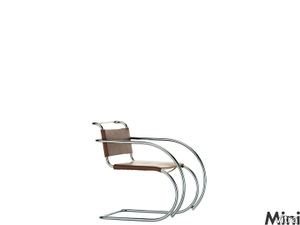
vitra > Styling
During the mid-twenties, tubular steel won favor among avant-garde designers as a preferred material for furniture design. The most important designs for tubular steel, now regarded as classics of modern furniture design, were created within the course of just a few years. <br/><br/>During preparations for the Weissenhof exhibition in Stuttgart, Mart Stam developed a new chair type, the tubular steel chair with no back legs. In order to counter the possible instability of the cantilevered frame, Stam reinforced the steel tubing at critical angles, thereby creating a strong, but rigid structure. It was Mies van der Rohe who first discovered the elasticity of steel tubing and utilized it as a structural principle.<br/><br/>Inspired by Stam's idea, he designed the first flexible cantilevered chair in the history of design in 1927. The model was produced both with and without armrests under the names MR 20 and MR 10, respectively. The tubular steel furniture of the 1920s represents a rejection of the conventional, overladen bourgeois interior of the time, filled with massive furniture and decorative trinkets. The transparency and structural clarity of tubular steel furniture embodies a new ideal in architecture and design: interior space flooded with natural light.
EAMES ELEPHANT PLYWOOD SPECIAL EDITION - Multi-layer wood game _ Vitra
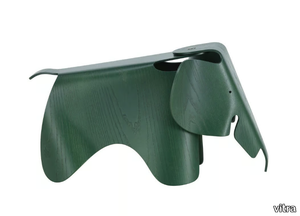
vitra > Chair
The **Eames Special Collection 2023** by Vitra introduces a stunning re-edition of the iconic **Eames Elephant Plywood**, now available in a rich dark green finish, celebrating the legacy of Charles and Ray Eames. Originally conceived in the 1940s as part of their groundbreaking exploration of moulded plywood, the elephant design was one of their most technically ambitious projects due to its intricate compound curves, yet it never entered mass production. A single prototype, gifted to Charles’s daughter Lucia, became a cherished piece of design history and is now part of the Eames family collection. Following a limited release in 2007, Vitra reintroduced the plywood version in 2017, featuring a high-quality American cherry veneer, and later expanded the collection to include a durable plastic version for children, as well as a smaller, colorful variant. Whether as a sophisticated wooden sculpture for the living room, a playful toy for kids, or a charming decorative piece, the Eames Elephant continues to captivate with its timeless design and joyful charm. Additionally, a **3D file of the product is available for download**, offering designers and enthusiasts the opportunity to explore its iconic form in detail. Vitra, a Swiss family-owned company founded in 1950 by Willi Fehlbaum, is renowned for its innovative and timeless furniture, lighting, and accessories, crafted in collaboration with legendary designers like Charles and Ray Eames, George Nelson, and Verner Panton. Known for blending functionality with aesthetics, Vitra’s designs are celebrated for their versatility, durability, and modern appeal, making them a favorite for homes, offices, and public spaces worldwide.
RAR - Rocking upholstered fabric chair with armrests _ Vitra
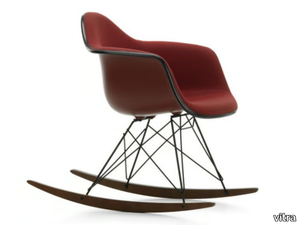
vitra > Chair
The Plastic Chairs, designed by Charles and Ray Eames, are iconic pieces of furniture, with the Rocking Armchair Rod Base (RAR) standing out as a particularly notable model. This chair combines compact dimensions with exceptional comfort, making it suitable even for taller users, and is available with optional seat cushions or full upholstery. The RAR features a distinctive rocker base with solid maple runners, adding a striking visual accent to any space. The seat shell is made of dyed-through polypropylene, with options for different colors and upholstery, allowing for a wide range of customizable combinations. From January 2024, Vitra has introduced the Eames Plastic Chairs RE, made from recycled post-consumer plastic sourced from Germany's 'Yellow Bag' household waste collection, significantly reducing environmental impact. The chairs are versatile, available in various configurations such as dining chairs, rocking chairs, swivel chairs, and stacking versions, with bases like the elegant Eiffel Tower design. A 3D file of the product is available for download, enabling customers to visualize the chair in their space. Vitra, the Swiss family-owned company behind these chairs, is renowned for its innovative and timeless designs, collaborating with legendary designers like Charles and Ray Eames to create furniture that blends functionality, aesthetics, and sustainability for homes, offices, and public spaces worldwide.
Soft Wait
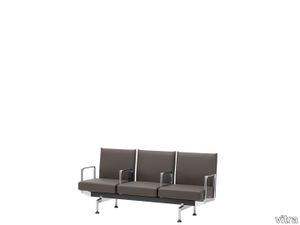
vitra > Bench
The sofa-style waiting area system Soft Wait combines casual comfort and ergonomic seating, while also being suited to heavy use and the exacting demands of public spaces.
Miniatures Plywood Elephant natur
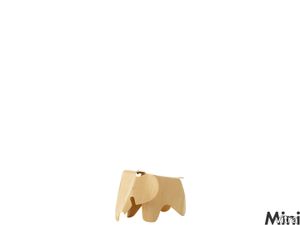
vitra > Styling
The Plywood Elephant holds a prominent place among the plywood pieces designed by the Eameses. In the early 1940s Charles and Ray Eames successfully developed an innovative method for moulding plywood into three-dimensional shapes, which they used to produce a wide range of furniture and sculptural objects. Among the early plywood designs, the Elephant is one of the most difficult to produce. Tight angles and compound curves require a sophisticated mastery of plywood technology.<br/><br/>Designed at the same time as their children's furniture, the Plywood Elephant can also be seen as a playful counterpart to the leg splints developed by the Eameses for military applications – which were the very first mass-produced objects made of threedimensionally moulded plywood. <br/><br/>Requiring complex fabrication methods, the Plywood Elephant never went into production. Only two prototypes were made, both of which were displayed at the New York Museumof Modern Art in 1945-46. Today only one known model remains in the possession of the Eames Family. In 2007 Vitra produced the first commercial production of the legendary Eames Plywood Elephant as a limited Collector's Edition.
Polder Ottoman
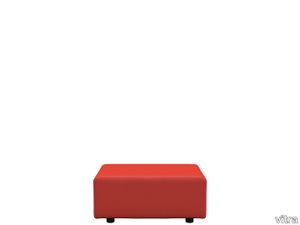
vitra > Pouf
The distinctive character of Hella Jongerius's comfortable Polder Sofa derives from the combination of diverse fabrics and colours, an asymmetrical shape and charming details.
Wiggle Stool
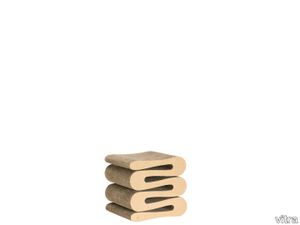
vitra > Styling
The Wiggle Stool is part of Frank Gehry's 1972 furniture series 'Easy Edges', which successfully introduced a new aesthetic dimension to such an everyday material as cardboard. The iconic stool is robust and lends a striking note to any interior.
Wall Clocks - Star Clock
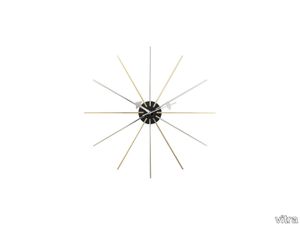
vitra > Styling
With his collection of Wall Clocks (1949-1960), George Nelson conceived a wide array of timepieces, many of which have since become icons of 1950s design.
MARIPOSA 2-SEATER - 2 seater sofa with removable cover _ Vitra
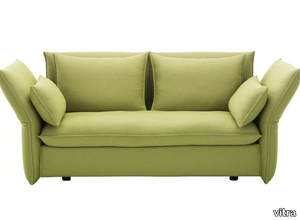
vitra > Sofa
The Mariposa Two-Seater Sofa combines compact design with luxurious comfort, making it an ideal choice for urban living where space is limited. Its full-length seat cushions provide an elegant and spacious feel, while the adjustable side and backrest elements allow for personalized reclining positions, ensuring exceptional comfort. The sofa features a webbed metal frame with polyurethane foam, seat cushions made of polyurethane and visco foams with a feather-filled chamber cushion overlay, and back and armrest cushions filled with stripped-quill feathers and PU rods. Removable covers and plastic glides with leveling adjustment add to its practicality. Designed for residential use, the Mariposa Sofa radiates a sense of spacious comfort with its balanced proportions and soft upholstery, creating a cozy oasis. The name "Mariposa," meaning butterfly in Spanish, reflects the sofa's wing-like motion range. A 3D file of the product is available for download, allowing for easy visualization and planning. Vitra, a Swiss family-owned company founded in 1950, is renowned for its innovative and iconic furniture designs that blend functionality with aesthetics, collaborating with legendary designers like Charles and Ray Eames to create timeless, versatile, and durable pieces for homes, offices, and public spaces.
EAMES WOOL BLANKET LIMITED EDITION - Jacquard reversible merino wool blanket _ Vitra

vitra > Furniture accessories
The ‚Dot Pattern‘ textile, designed by Charles and Ray Eames in 1947, is a striking large-scale graphic composition of crosses and dots, inspired by Ray Eames' abstract paintings from the 1930s. Crafted from 100% Merino lambswool in a jacquard weave, this limited-edition Vitra blanket is made from the first shearing of Merino lambs, offering a lightweight, soft, and warm natural fiber with exceptional thermal balance. Produced by a century-old German blanket manufacturer renowned for its expertise in natural fiber craftsmanship, the blanket exemplifies Vitra's commitment to quality and design. A 3D file of the product is also available for download. Vitra, a Swiss family-owned company founded in 1950, is celebrated for its innovative, timeless designs in furniture, lighting, and accessories, collaborating with iconic designers like the Eames to create functional, aesthetically pleasing pieces for homes, offices, and public spaces.
AKARI UF4-L10 - Japanese paper floor lamp _ Vitra
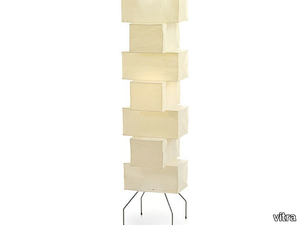
vitra > Floor lamp
The Akari floor lamp, inspired by the iconic Akari Light Sculptures created by Japanese-American artist Isamu Noguchi in 1951, features a delicate Japanese washi paper lampshade that exudes a soft, weightless luminosity. Handcrafted by skilled artisans at the Ozeki workshop in Gifu, Japan, each lamp is meticulously constructed using traditional techniques: bamboo rods are stretched across Noguchi's original wooden forms to create the framework, and washi paper, made from mulberry tree bark, is carefully cut and glued to the structure. The result is a harmonious blend of art and functionality, embodying Noguchi's vision of transforming electric light into a warm, sun-like glow. The lamp is marked with a stylized sun-and-moon logo, symbolizing its authenticity, and is conveniently packed in a flat box for easy storage or shipping. A 3D file of the Akari floor lamp is also available for download, allowing for detailed visualization and planning. Supplied by Vitra, a renowned Swiss family-owned company founded in 1950, the Akari lamp is part of Vitra's extensive collection of innovative and timeless designs, crafted in collaboration with world-class designers and celebrated for their modern aesthetics, functionality, and durability.
Wooden Doll No. 6
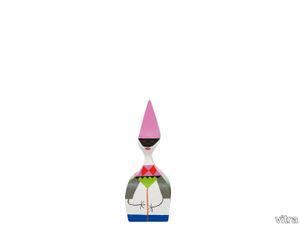
vitra > Styling
Alexander Girard originally created the Wooden Dolls (1952), a whimsical assortment of figures both joyful and grim, for his own home. Today they add a charming touch to any interior.
GRAND REPOS & OTTOMAN - Swivel recliner armchair with footstool _ Vitra
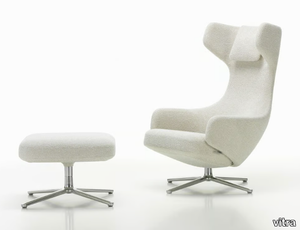
vitra > Armchair
The Grand Repos wing chair features a concealed synchronized mechanism beneath its upholstery, allowing users to lock it in any position for optimal back support and unparalleled comfort at any reclining angle. Its distinctive headrest design encourages relaxation, offering a sense of privacy and coziness, while decorative seams on select fabric or leather versions add an artisanal touch. Paired with the Grand Repos Ottoman, this lounge chair elevates comfort by providing a place to rest your feet, creating a complete relaxation experience. The chair is constructed with moulded polyurethane foam, a webbed plastic frame, and an integrated synchronized locking mechanism, while the Ottoman features a plastic panel, polyurethane foam, and polyester fibre. Both pieces are supported by a four-star die-cast aluminium base, available in polished or powder-coated finishes, with glides tailored for soft or hard floors. A feather-filled neck pillow enhances comfort, and the backrest resistance can be adjusted to suit the user's weight, ensuring ergonomic support. Developed in collaboration with renowned designer Antonio Citterio, the Grand Repos collection redefines home comfort with its generous padding, high backrest, and swivel base. A 3D file of the product is available for download, offering a detailed preview for design planning. Vitra, the Swiss family-owned company behind this iconic design, has been a leader in innovative furniture since 1950, blending functionality with timeless aesthetics in collaboration with world-class designers.
Miniatures Gartenstuhl
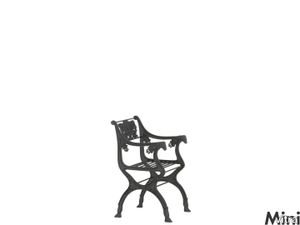
vitra > Styling
Industrialization, with its new manufacturing techniques and materials began to supplant the traditional turner's and woodcarver's crafts in furniture-making. Long before Michael Thonet's first experiments with bent wood the use of iron had led to important innovations in this field. As early as 1736 an armaments manufacturer established by tsar Peter the Great started to produce large quantities of furniture made of cast iron.<br/><br/>Karl Friedrich Schinkel, a Prussian master builder, also used the cast iron process to rationalize furniture production. It was Schinkel's architectural work in particular which earned him the reputation of one of the major exponents of German »classicism«, but his work as a furniture designer was also of great significance. His elegant interpretations of the »classics« produced designs of formal austerity for all kinds of different purposes. Schinkel's designs included not only wooden furniture but also, at the beginning of the 19th century, large numbers of iron trestle tables, garden furniture and other items of furniture.
WOODEN DOLL LITTLE DEVIL - Wooden sculpture _ Vitra
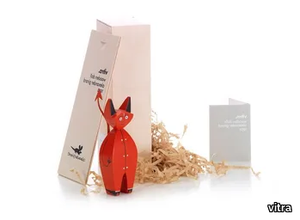
vitra > Styling
Crafted from solid fir and meticulously hand-painted, this charming Wooden Doll, inspired by Alexander Girard's iconic designs, is a delightful blend of folk art and modern aesthetics. Girard, a pioneer of postwar American design alongside Charles and Ray Eames and George Nelson, drew inspiration from his extensive collection of South American, Asian, and Eastern European folk art to create these decorative yet playful pieces. The doll comes elegantly packaged in a high-quality wooden gift box with a printed label and includes a brochure for added context. A 3D file of the product is also available for download, offering a digital perspective of this timeless design. Supplied by Vitra, a renowned Swiss family-owned company founded in 1950, this product reflects the brand's commitment to innovative, functional, and aesthetically pleasing designs, crafted in collaboration with some of the world's most celebrated designers.
UNIX CHAIR - Stackable training chair with armrests _ Vitra
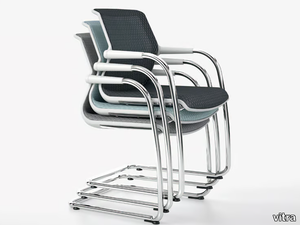
vitra > Chair
The Unix Chair Cantilever, crafted from chrome-plated tubular steel on glides, is a versatile seating solution available in both non-stacking and stacking versions (up to 4 chairs), making it an ideal choice for office environments. Designed as the ultimate all-rounder, it seamlessly transitions from a task chair behind a desk to a visitor chair in front of it, and is equally suited for conferences, meetings, touchdown workstations, and waiting areas. Its structural design, combined with an innovative padded mesh cover, ensures exceptional comfort, while a wide range of color options allows it to adapt to both sleek, functional office settings and more expressive, personalized workspaces. For added convenience, a 3D file of the Unix Chair is available for download, enabling detailed visualization and planning. Manufactured by Vitra, a Swiss family-owned company founded in 1950, the Unix Chair reflects the brand’s commitment to innovative, timeless designs that blend functionality with aesthetics, as seen in their collaborations with iconic designers like Charles and Ray Eames. Vitra’s global presence, with headquarters in Birsfelden, Switzerland, and branches worldwide, ensures accessibility and support for their diverse range of furniture and lighting solutions.
JOYN SINGLE DESK - Workstation desk _ Vitra
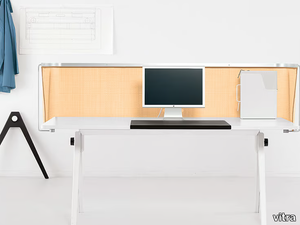
vitra > Desk
Joyn is not just a piece of office furniture; it is a transformative workspace solution and a management tool designed to adapt to the evolving demands of modern work culture. This innovative platform condenses multiple spatial functions into a single, modular plane, offering flexibility and spontaneity to meet changing needs and technologies. Joyn fosters productive, collaborative work environments by encouraging communication and cooperation. Additionally, a downloadable 3D file of the product is available for further exploration and planning. Manufactured by Vitra, a Swiss family-owned company founded in 1950, Joyn reflects the brand's legacy of creating iconic, functional, and aesthetically pleasing designs. Vitra collaborates with world-renowned designers to produce versatile, durable, and timeless furniture for homes, offices, and public spaces, making it a trusted name in the industry.
Wooden Doll No. 1
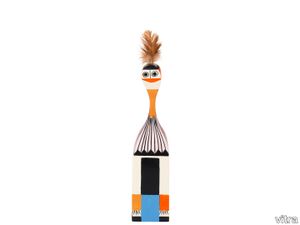
vitra > Styling
Alexander Girard originally created the Wooden Dolls (1952), a whimsical assortment of figures both joyful and grim, for his own home. Today they add a charming touch to any interior.
Akari 20N
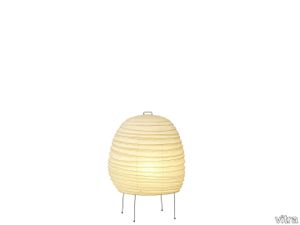
vitra > Styling
The Akari Light Sculptures (1951) by Isamu Noguchi are a series of luminaires, handcrafted from traditional washi paper by Japanese artisans. ‘The harshness of electricity is thus transformed through the magic of paper back to the light of our origin – the sun.’ (Noguchi)
SOFT WORK - Round high side table _ Vitra
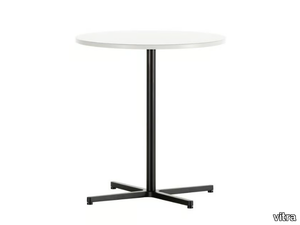
vitra > Coffee table
The **Soft Work Table** is a versatile and ergonomic solution designed not only as a sofa side table but also as a collaborative workspace, ideal for modern, flexible work environments. Featuring a sleek x-shaped base that can be equipped with castors or glides, it allows for easy mobility and adaptable seating positions. The table top is available in round or boat-shaped designs, offered at heights of 45 cm and 71 cm, and crafted from durable materials like melamine or veneer, supported by a powder-coated tubular steel base. Designed to integrate seamlessly into the **Soft Work** system by Vitra, this table is part of a broader concept that reimagines workspaces, blending comfort and functionality to support both individual and team-based activities. A 3D file of the product is available for download, enabling architects and designers to visualize and plan its integration into various settings. **Supplier Description:** Vitra, a Swiss family-owned company founded in 1950, is renowned for its innovative and iconic furniture designs, collaborating with world-class designers to create timeless, functional, and aesthetically pleasing pieces for homes, offices, and public spaces.
DINING TABLE - Round dining table _ Vitra
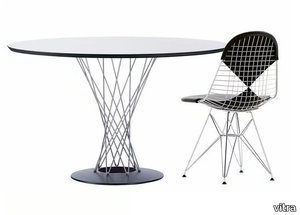
vitra > Table
The Dining Table, designed by the renowned artist and designer Isamu Noguchi, stands as one of the most elegant and iconic dining tables in twentieth-century design history. Its sleek, minimalist design features a tabletop supported by a cast iron base ring connected with chrome-plated steel wire rods, offering both stability and a lightweight aesthetic. The tabletop is available in two sizes and is crafted from plywood with a durable hard laminate surface and a black-stained edge, while the base is finished in black lacquer for a refined look. A 3D file of the product is available for download, allowing for detailed visualization and planning. Vitra, the Swiss family-owned company behind this masterpiece, has been a pioneer in furniture design since 1950, collaborating with legendary designers to create timeless, functional, and aesthetically pleasing pieces for homes, offices, and public spaces.
SOFT PAD CHAIR EA 222 - Recliner leather armchair with 4-spoke base _ Vitra
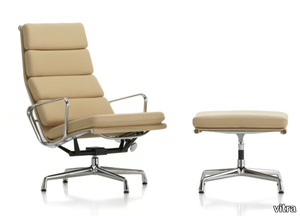
vitra > Armchair
The Soft Pad Chair EA 222, designed by Charles and Ray Eames, combines timeless elegance with exceptional comfort, featuring a high backrest, low seat, and an adjustable tilt mechanism that adapts to the user's weight for personalized support. Paired with the matching EA 223 stool, it creates an ideal setup for relaxation, perfect for long evenings with a good book. The chair’s design, dating back to 1969, showcases sewn-on cushions upholstered in premium leather or standard leather, complemented by sleek die-cast aluminium side profiles, armrests, and a four-star base, available in polished, chrome-plated, or deep black powder-coated finishes. Its soft, voluptuous cushions contrast beautifully with the slender aluminium frame, offering a harmonious blend of comfort and minimalist design. Vitra, the renowned Swiss family-owned company behind this iconic piece, has been producing high-quality furniture since 1950, collaborating with legendary designers to create functional, durable, and aesthetically pleasing pieces for homes, offices, and public spaces. A 3D file of the Soft Pad Chair EA 222 is available for download, allowing designers and enthusiasts to explore its details digitally. Backed by a 30-year guarantee, Vitra ensures exceptional craftsmanship and longevity, making this chair a timeless investment in comfort and style.
SOFTSHELL SIDE CHAIR - Upholstered chair _ Vitra
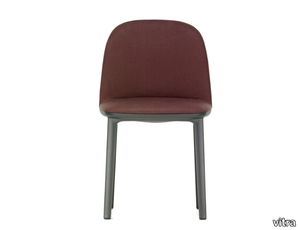
vitra > Chair
The Softshell Side Chair, with its sleek, soft upholstery and gentle contours, delivers exceptional comfort and compact design, making it ideal for extended sitting periods. Its backrest features concealed vertical ribs that adapt to the user, offering flexibility and freedom of movement, while the four-legged plastic base adds a touch of understated elegance. The chair’s smooth, inviting surface and ergonomic construction ensure a cozy and supportive seating experience. A 3D file of the Softshell Side Chair is available for download, allowing for detailed visualization and planning. Designed and manufactured by Vitra, a Swiss family-owned company renowned for its innovative, timeless furniture and collaborations with iconic designers, the Softshell Side Chair exemplifies Vitra’s commitment to blending functionality, comfort, and modern aesthetics.
Wall Clocks - Flock of Butterflies
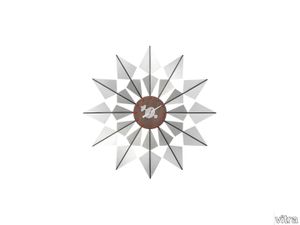
vitra > Styling
With his collection of Wall Clocks (1949-1960), George Nelson conceived a wide array of timepieces, many of which have since become icons of 1950s design.
GIRARD BIRD - Maple bookend _ Vitra

vitra > Accessories
Originally crafted in the mid-1940s by the visionary designer Alexander Girard, this abstract avian sculpture was hand-carved from apple tree wood and later featured in the July 1945 issue of *Arts & Architecture*. Today, the Girard Bird (1945) has been meticulously revived by Vitra in collaboration with the Girard family, preserving its minimalist yet distinctly avian form. Made from solid French maple wood, this archaic-inspired figure can elegantly balance on either its feet or tail, showcasing Girard’s timeless design ethos. Alongside his contemporaries Charles and Ray Eames and George Nelson, Girard was a pioneer of post-war American design, celebrated for his work in textiles, graphic art, and interior design. A 3D file of the Girard Bird is available for download, allowing enthusiasts to explore its design in detail. Vitra, a Swiss family-owned company founded in 1950, is renowned for its innovative and iconic furniture, lighting, and accessories, collaborating with legendary designers to create pieces that seamlessly blend functionality, aesthetics, and durability for residential, office, and public spaces worldwide.
Rayonnage Mural
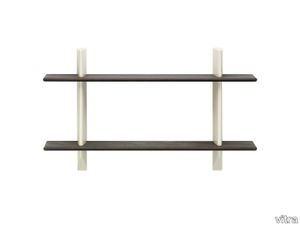
vitra > Styling
Reminiscent of the rudder of an aircraft or ship, the streamlined shape of the two wall brackets of the Rayonnage Mural bookcase (1936) is a recurring element in Prouvé's creative oeuvre.
TERRACOTTA POTS MEDIUM - Terracotta vase _ Vitra
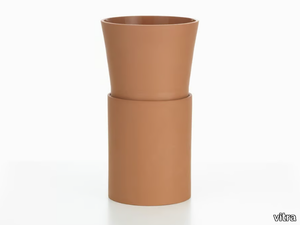
vitra > Accessories
The Terracotta Pots, designed by Vitra in collaboration with French designer Thélonious Goupil, are crafted from dense, high-quality Italian clay, pressed into elegant column-like forms and fired to create durable, water-resistant planters. Available in four sizes—XS, S, M, and L—the pots elevate plants, giving them a striking presence in any space. The XS and S models are ideal for tabletops or display surfaces, while the M and L variants are designed for floor placement. The S-sized version also comes as a versatile three-part set, allowing for creative plant arrangements. Each pot features a glazed interior and a drainage hole for practicality. A 3D file of the product is available for download, offering a digital preview for design enthusiasts. Vitra, a Swiss family-owned company founded in 1950, is renowned for its innovative, timeless designs in furniture, lighting, and accessories, collaborating with iconic designers to create pieces that blend functionality with modern aesthetics.
Classic Trays - Baby's Breath
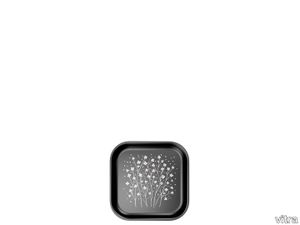
vitra > Styling
The Classic Trays (1945-74) by Alexander Girard and Charles and Ray Eames come in three sizes. Made of laminated plywood, they feature motifs from the rich store of images created by these legendary designers.
MINIATURES STOOL MODEL C - Wooden miniature _ Vitra
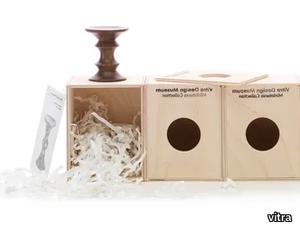
vitra > Styling
The Vitra Design Museum’s Miniatures Collection offers meticulously crafted, one-sixth-scale replicas of iconic furniture designs, capturing the evolution of industrial furniture design from Historicism and Art Nouveau to Bauhaus, Radical Design, Postmodernism, and contemporary styles. Each miniature chair is a true-to-scale masterpiece, replicating the finest details of construction, materials, and colors, including the natural grain of wood, screws, and intricate craftsmanship. These miniatures are not only cherished collector’s items but also serve as valuable educational tools for universities, design schools, and architects. A 3D file of the product is available for download, allowing for further exploration and use in design projects. The collection is produced by Vitra, a Swiss family-owned company founded in 1950 by Willi Fehlbaum, renowned for its innovative and timeless furniture, lighting, and accessories designed in collaboration with legendary creators like Charles and Ray Eames, George Nelson, and Verner Panton. With a global presence and a commitment to blending functionality with aesthetics, Vitra continues to shape modern design across residential, office, and public spaces.
Girard Ornaments - Moon
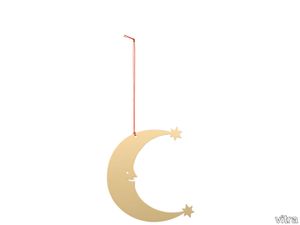
vitra > Styling
The range of motifs does not limit the use of Ornaments by Alexander Girard to seasonal occasions but a number of them are perfect, for example, for Christmas time.
DCW - Ash chair _ Vitra
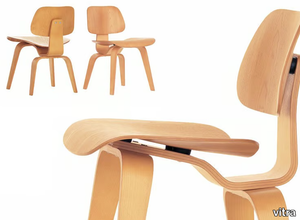
vitra > Chair
The DCW (Dining Chair Wood) from Vitra features a back and seat crafted from moulded ash plywood, available in natural or black stained finishes, paired with a matching moulded plywood base. The seat and backrest are securely attached to the base using shock mounts, which consist of bonded rubber and metal connectors for enhanced durability and comfort. Inspired by the groundbreaking work of Charles and Ray Eames, who spent years perfecting three-dimensionally moulded plywood to conform to the human body, this chair is a testament to timeless design and ergonomic innovation. The organic shape of the plywood shells and the slightly flexible backrest ensure exceptional comfort, even without upholstery. Part of the iconic Plywood Group, the DCW is available alongside other variations like the LCW (Lounge Chair Wood) and metal-based DCM and LCM models. A 3D file of the product is available for download, allowing for detailed visualization and planning. Vitra, a Swiss family-owned company founded in 1950, is renowned for its collaboration with legendary designers and its commitment to creating functional, aesthetically pleasing furniture and accessories for homes, offices, and public spaces. With a global presence and a reputation for blending modernism with timeless design, Vitra continues to deliver versatile, durable, and stylish solutions for diverse environments.
AC 5 Meet
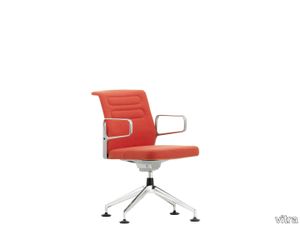
vitra > Chair
AC 5 Meet is the classic conference chair in the AC 5 Group of office chairs. Thanks to the understated elegance of its design and the use of high-quality materials, AC 5 Meet cuts a fine figure in both traditional and contemporary conference settings. The shape of the chair's backrest enables considerable freedom of movement, and it is combined with a rocking mechanism and shock-absorbing seat suspension to offer superb comfort – even during prolonged periods of sitting.